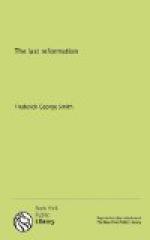It is a fact of history that the primary purpose of the historical creeds was not to unite men but to separate them. The Nicene Creed was made to exclude the Arians. The Decrees of the Council of Trent were framed to exclude Protestants; the Westminster Confession, to exclude Arminians; and the Episcopal Articles, to exclude Catholics and Independents. To rally around a creed framed by human authority and make it the basis of union is but to teach a system—a sect system; but to rally around the person of Jesus Christ and make him the supreme object of our faith, hope, and love is to contend for what the Bible terms the faith, the truth, the gospel. This is infinitely better than any document proceeding from Nicea, Trent, Dort, Augsburg, or Westminster.
[Sidenote: Power of the keys]
Another cause, both for the origin of the sect system and its perpetuation, is the assumed “power of the keys” which has been carried over from the Church of Rome. The idea that the administrative rule and government of the church of Christ has been, by divine decree, centralized in a self-perpetuating clerical caste with authority to legislate for the church and then to enforce its decisions by judicial procedure, is foreign to the primitive church as recorded in the New Testament. It is a product of Papalism, and yet it has been, in its essential characteristics, transferred directly to the sects of Protestantism. The New Testament recognizes no such human positional authority. It recognizes only that divine authority which operates through God’s chosen ministers and helpers by virtue of the Spirit-bestowed gifts and qualifications. The only governmental authority exercised by the New Testament ministers was in cooperation with Christ, the visible head, by putting forth, in accordance with the Spirit’s gifts and qualifications, some portion of that moral power by which alone Christ governs.
The idea that to a clerical order has been committed the exclusive guardianship of the church, with full power to admit to or exclude from the worship and service of God all except those who come by way of their priestly mediation, is the basest assumption. It is a violation of the rights of individual conscience. Yet just such power has been and still is being exerted as a means of enforcing acquiescence in matters of opinion and submission to customs and practises which every unprejudiced man knows, or can soon see, is no part of the New Testament teaching and requirements. What a weapon has this ecclesiastical assumption been! One always ready for use. It makes no difference whether it is wielded by a Methodist conference, an Episcopal judicatory, a Presbyterian synod, or a Catholic pope, it is all the same in principle—“the power of the keys.”




